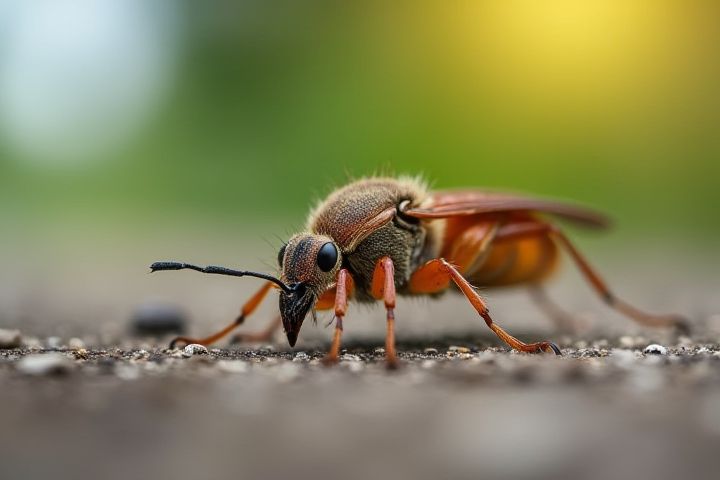
To effectively protect your house from pests, ensure that all entry points, including cracks and gaps around windows and doors, are sealed with caulk or weather stripping. Regularly maintain your yard by trimming shrubs and removing debris, as these can serve as nesting sites for insects and rodents. Install screens on vents and chimneys to deter pests from gaining access. Store food in airtight containers and promptly clean up spills and crumbs to eliminate attractants. Hiring a professional pest control service for routine inspections can further prevent infestations and protect your home's integrity.
How To Protect A House From Pests
Seal entry points
To effectively protect your house from pests, sealing entry points is crucial. Inspect areas such as doors, windows, and the foundation for gaps or cracks larger than 1/8 inch, which are common entry routes. Using caulk for smaller openings or weatherstripping for doors and windows can significantly reduce pest infiltration. Furthermore, installing door sweeps on exterior doors can create an added barrier, limiting access for common household pests like ants and rodents.
Maintain cleanliness
Maintaining cleanliness is vital in protecting your house from pests, as over 50% of pest infestations can be traced back to food sources and clutter. Regularly vacuuming carpets and upholstery, along with sweeping and mopping hard floors, helps eliminate crumbs and residues that attract insects. Storing food in airtight containers can reduce the allure of pantry pests by up to 90%, so ensure your kitchen is organized and tidy. Keeping outdoor areas clean, including trimming vegetation and clearing debris, creates a less inviting environment for pests to thrive.
Proper food storage
Proper food storage is essential for protecting your house from pests. Seal food items in airtight containers made of glass or heavy-duty plastic to deter insects and rodents. Regularly organize and clean your pantry to eliminate crumbs and spills that attract unwanted visitors. Ensuring trash bins have tight-fitting lids further minimizes pest access to food sources, creating a less inviting environment for infestations.
Regular garbage disposal
Regular garbage disposal is crucial in preventing pest infestations in your home. By maintaining a consistent schedule, ideally daily or every other day, you minimize attractants such as food waste, which can lure insects like ants, cockroaches, and rodents. Use tightly sealed trash bins and check that they are emptied frequently, as even small remnants of food can invite unwanted guests. Proper disposal not only keeps your surroundings clean but also reduces the risk of disease transmission associated with pests.
Dehumidify interiors
Dehumidifying your interiors can significantly reduce the risk of pest infestations, as most pests thrive in humid environments. Using a dehumidifier can lower indoor humidity levels to a safe range of 30-50%, making your home less inviting to insects like termites and cockroaches. Regularly checking areas prone to moisture, such as basements and bathrooms, and using exhaust fans can further enhance your pest control efforts. Maintaining proper ventilation in your home not only protects against pests but also contributes to a healthier living environment.
Trim overgrown vegetation
Trimming overgrown vegetation is essential in pest prevention, as dense shrubs and tall grass provide ideal habitats for insects and rodents. Maintaining a distance between plants and your home by at least 18 inches can significantly reduce the likelihood of infestations. Regularly cutting back overgrown branches and weeds not only minimizes pest access but also enhances sunlight exposure and airflow, inhibiting pest breeding. Implementing this practice twice a year can effectively safeguard your property and contribute to a healthier landscape.
Use natural repellents
Natural repellents, such as essential oils like peppermint, eucalyptus, and tea tree oil, can significantly deter pests from invading your home. You can create a mixture using 10-15 drops of these oils in a spray bottle filled with water, applying it to entry points such as windowsills and door frames. Keeping your home clean and clutter-free, particularly areas like the kitchen and pantry, reduces food sources that attract pests. Planting pest-repelling herbs like basil, lavender, and rosemary around your home's perimeter can create a natural barrier against unwanted insect intruders.
Install door sweeps
Installing door sweeps is crucial for pest prevention, as gaps beneath doors can serve as entry points for insects and rodents. Choose high-quality materials designed for various door types, ensuring a snug fit that blocks even the smallest openings, which may be as narrow as 1/8 inch. A well-installed door sweep can reduce the chances of uninvited pests by up to 50%, contributing significantly to overall home defense. Regular inspections and maintenance of these sweeps will further enhance your home's protection, keeping pests at bay throughout the year.
Regular inspections
Regular inspections are crucial for protecting your house from pests, as they help identify potential entry points and breeding grounds. Schedule seasonal check-ups to examine areas such as basements, attics, and crawl spaces for signs of infestations, moisture, or structural damage. Pay attention to gaps around windows, doors, and piping, sealing any openings with caulk or weatherstripping to deter pests. By maintaining this proactive approach, you can effectively safeguard your home and create an inhospitable environment for unwanted invaders.
Professional pest control
Professional pest control services offer comprehensive solutions tailored to protect your home from unwanted insects and rodents. Technicians typically conduct a thorough inspection to identify entry points and nesting sites, addressing potential vulnerabilities effectively. Utilizing advanced methods and eco-friendly products, they target pests while ensuring the safety of your family and pets. Regular maintenance, often recommended bi-annually, can significantly reduce the risk of infestations, keeping your home pest-free year-round.
